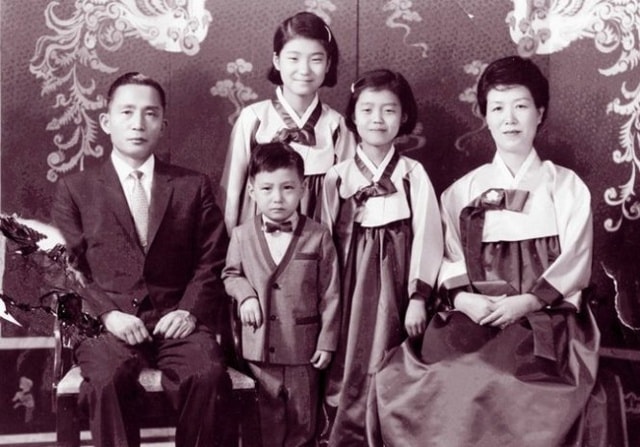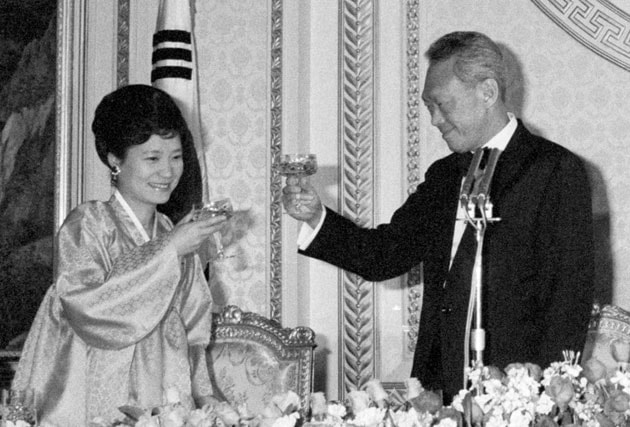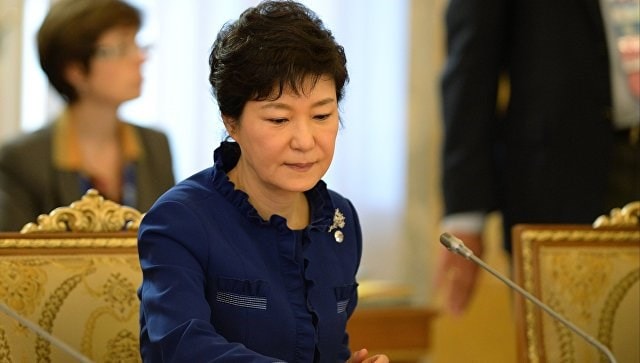The difficult life of Korea's number one woman
(Baonghean.vn) - In 2013, Park Geun-hye became the first female president of South Korea. Three years later, a political scandal pushed the powerful woman into the "abyss".
The early years of life
Park Geun-hye, the first female president of South Korea, was born on February 2, 1952, in Daegu, North Gyeongsang Province, South Korea. She is the daughter of former South Korean President Park Chung-hye (in office from 1961 until her assassination in 1979) and former First Lady Yuk Young-soo (who was shot and died in an assassination attempt on her husband in 1974).
 |
| Mrs. Park's family. Photo: Internet. |
Chung-hee began his 18-year rule when his daughter was just 11. His presidency divided South Korea, and later became the subject of controversy surrounding his daughter Park Geun-hye's presidential campaign.
Critics call him a dictator who abused human rights and stunted democracy in South Korea; supporters say he transformed the economy and helped the country recover from the Korean War.
Get into politics
After graduating from high school, Park Geun-hye enrolled in Sogang University in Seoul, graduating with a bachelor of science degree in engineering in 1974. That same year, the young Park experienced a terrible tragedy: Her mother was shot and later died at the hands of the assassin Mun Segwang, whom South Korea claimed was a North Korean assassin who plotted to assassinate the South Korean President. The people of this country were extremely saddened by the passing of Yuk Young-soo - the First Lady who was widely known and loved by the people.
Putting aside her unspoken personal pain, Park Geun-hye became the "acting first lady" - a title that required completely new responsibilities for a 22-year-old girl who had just graduated from university.
Yet, Park still adapted well to the world of politics: right from when she took on the role of first lady, Ms. Park was very graceful but no less efficient when meeting with high-ranking officials, managing state affairs, as well as many other duties...
Five years after her mother's death, Park Geun-hye once again had to face tragedy: her father, President Park Chung-hee, was assassinated by the head of the intelligence agency, Kim Jae-kyu, at a dinner party on October 26, 1979.
 |
| Park Geun-hye replaced the role of the late first lady in 1979. Photo: Internet. |
Female Member of Parliament
After assuming the role of First Lady, Park continued to develop and achieve success in Korean politics, being appointed Vice Chairwoman of the Grand National Party (GNP) in 1998. In the same year, she began her position as a National Assembly member. She was subsequently re-elected four times, serving five consecutive National Assembly terms. By that time, Park had developed a clear goal of not only uniting the Korean party system, but also uniting and strengthening the entire country.
In 2003, Park became chairwoman of the GNP's presidential election committee. The following year, she was elected chairwoman of the GNP, amid the party's difficult period following its failed attempt to impeach President Roh Moo-hyun.
In 2007, she aimed for the presidency, becoming the party's candidate in the primaries, but lost to Lee Myung-bak, who went on to win the presidential election. In 2012, the GNP was renamed the Saenuri (New Front) Party. Park remains a key figure in the Saenuri Party, serving as chair of its emergency committee.
First female President of South Korea
In the historic vote on December 19, 2012, Ms. Park defeated her 59-year-old democratic opponent and former human rights lawyer Lee Myung-bak to win the ticket to the Blue House - true to her nickname "Election Queen" and more notably, became the first female president of South Korea.
Unmarried at the time of her election, Park often said she was “married” to the country. After her victory, Park promised a “new era” of government and pledged to be “the people’s president.” She pushed for unification and prosperity for South Korea, while remaining vigilant about the threat posed by North Korea. She was sworn in in February 2013.
 |
| Ms. Park is currently facing one of the biggest political scandals in Korean history. Photo: Internet. |
Political scandal and impeachment
As president, Park was criticized for abusing her power to silence the opposition, and polls showed she quickly became one of the country’s most hated leaders. In October 2016, she became embroiled in a corruption scandal that ultimately led to her political downfall.
Park is accused of extortion, abuse of power, bribery, and giving her confidante Choi Soon-sil, daughter of Choi Tae-min, the late religious leader and spiritual adviser to the Park family, access to classified information. Not only did Choi have access to classified information, but she also apparently edited Park’s speeches, knew in advance the president’s foreign travel itinerary, and even advised her on what to wear.
Upon hearing the news, the South Korean people did not hesitate to express their shock and anger. For six weeks, between 500,000 and 1,500,000 protesters took to the streets, demanding Park’s removal from office. Park’s approval rating fell to an all-time low of 4%. On October 9, 2016, the South Korean National Assembly accused Park of “serious violations of the Constitution and laws” and voted to impeach her.
Ms Park has apologised three times for the scandal, insisting she did not seek personal gain through her actions. “My heart breaks at the thought that I cannot resolve the people’s deep disappointment and anger even if I apologize 100 times,” she said in a statement.
Thu Giang
(According to Biography)
| RELATED NEWS |
|---|

